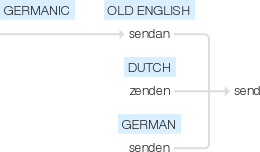Send
Old English sendan, of Germanic origin; related to Dutch zenden and German senden .
wiktionary
From Middle English senden, from Old English sendan(“to send, cause to go”), from Proto-West Germanic *sandijan, from Proto-Germanic *sandijaną, from Proto-Indo-European*sont-eye-(“to cause to go”), causative of *sent-(“to walk, travel”). The noun is from the verb.
etymonline
send (v.)
Old English sendan "send, send forth; throw, impel," from Proto-Germanic *sond- (source also of Old Saxon sendian, Old Norse and Old Frisian senda, Middle Low German and Middle Dutch senden, Dutch zenden, German senden, Gothic sandjan), causative form of base *sinþan, denoting "go, journey" (source of Old English sið "way, journey," Old Norse sinn, Gothic sinþs "going, walk, time"), from PIE root *sent- "to head for, go" (source also of Lithuanian siųsti "send;" see sense (n.)).
Also used in Old English of divine ordinance (as in godsend, from Old English sand "messenger, message," from Proto-Germanic *sandaz "that which is sent"). Slang sense of "to transport with emotion, delight" is recorded from 1932, in American English jazz slang.
